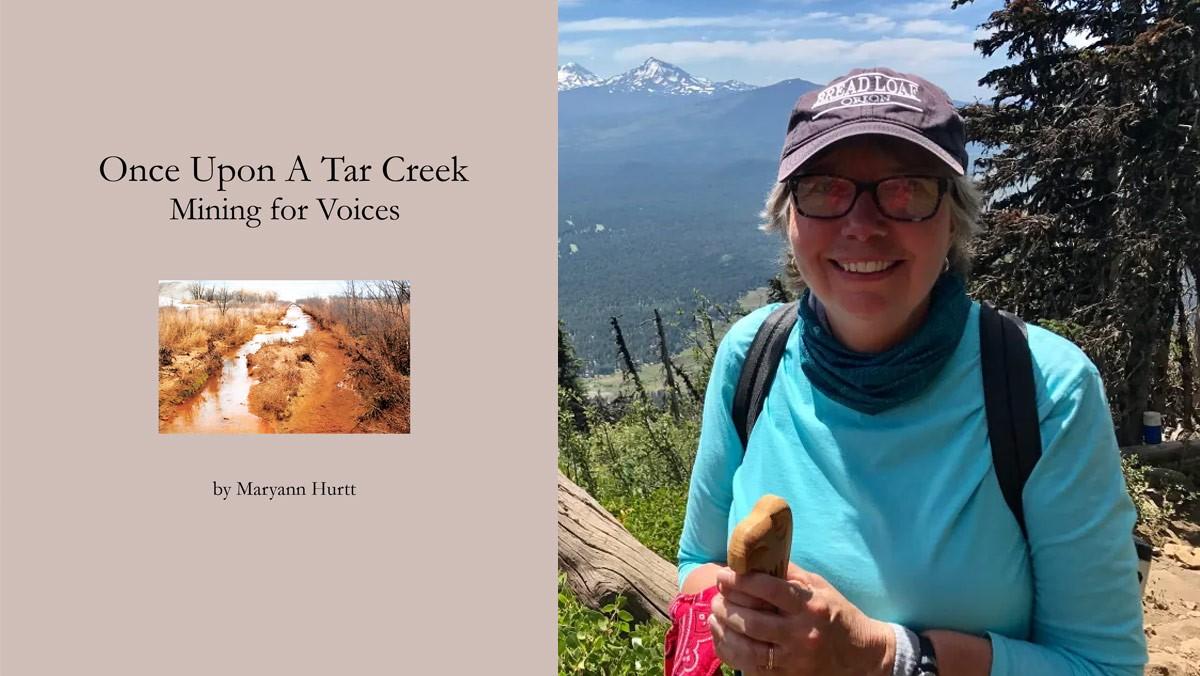Wisconsin poet Maryann Hurtt’s groundbreaking new book, Once Upon a Tar Creek: Mining for Voices, gives poetic voice to hard truths about Oklahoma’s Tar Creek environmental disaster, truths researched and supported with historical documents and interviews. Lead and zinc mining companies that leased land owned by the Quapaw Tribe in Tar Creek, left behind heavily contaminated mining waste from which metals leached into the soil, groundwater, ponds, and lakes. Elevated lead, zinc, and manganese levels in area residents resulted in learning disabilities and serious health problems, including high rates of miscarriage and neurological damage to children. The Environmental Protection Agency declared Tar Creek one of the most toxic areas in the United States.
Hurtt’s concise poems address a disaster so massive it is hard to grasp. Once Upon a Tar Creek: Mining for Voices marries poetry to historical research, laying bare the process such that readers feel the tragedy of Tar Creek seep into their pores. The intimacy of this plainspoken poetry provides a quiet way in, while the heft of her historical sources adds gravity and authenticity.
I was surprised to discover how many personalities from American history have wandered across this corner of Oklahoma. The speaker of “Military Road,” remembers “Quantrill, bushwackers / jayhawkers, miners / rebel boys, yankee boys / exiled Indians / looking for safely / revenge / maybe just home / some kind of rest.” Hearing the voice of Bonnie Parker recounting the shootout in Commerce, Oklahoma (“What Rhymes with Poet”), and that of Pretty Boy Floyd (Country Boy Meets the Robin Hood of the Cookson Hills”), It is easy to conclude that there was a darkness lingering in this patch of earth.
All great stories contain elements of ambiguity, and the ambiguity of our national story shines in the poem “Me Clark, Son of William Clark,” about the Nez Perce son of the explorer, William Clark. William Clark is foundational to the American story, but not his son, whose people were exiled to the Quapaw Agency. His story “will stick in your craw / set your thinking / right and wrong / how nobody wins / and we are all prisoners of war / when we do to the least of us.”
Similarly, the poem, “Incompetent Restricted Quapaw Indian about 50 Years Old,” refers to the practice of having Indians who had title to mineral-rich land declared insane. Even the rocks speak in this remarkable book, as in “An Orange Rock in an Orange Creek.” This poem is but one example of Hurtt’s ability to tell a big story through a chorus of small voices, even those of rocks and pebbles. Hurtt invites us to venture into this story, to seek a path to healing.
Once Upon a Tar Creek: Mining for Voices weaves in and out of what is upstream and what is downstream. The collection concludes with “Old Man at the Quapaw Pow Wow,” who dances “loose and light,” tapping the dirt, the earth.
someday the earth will let us go
than scudding leaves
free-falling clouds
maybe fox arteries
in the end
we become what we love
the echo still sings
The poems in this book, linked as they are with historical documents, dig deeply into this tragic, yet captivating, subject. The voices of Once Upon a Tar Creek: Mining for Voices echoed in my heart long after I closed the book, resonating with the knowledge that we all are, indeed, both upstream and downstream.




